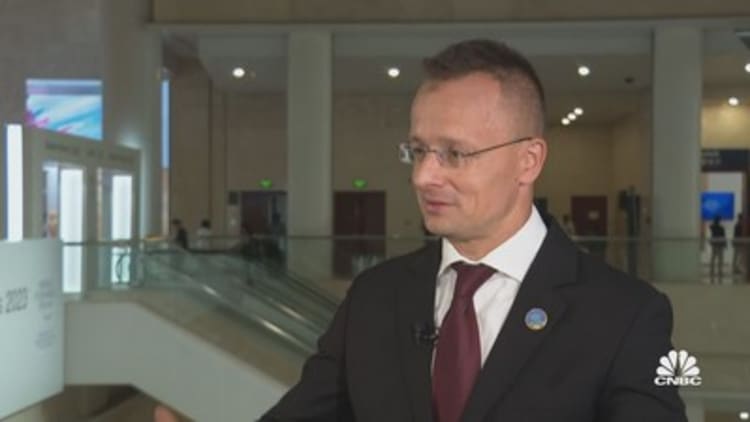European leaders have struggled to formulate a unified Sino-European strategy, with some states echoing U.S. calls for a complete disassociation — or decoupling — while others have preferred a softer, derisking approach.
Thomas Trutschel | Photothek | Getty Images
Hungary’s foreign minister said Tuesday that any move to decouple, or even de-risk, from China would be an act of “suicide” for Europe.
Péter Szijjártó said that curtailing ties with Beijing — one of Europe’s biggest trade partners and a major source of foreign direct investment — would essentially kill the region’s economy.
“Both decoupling and de-risking would be a suicide committed by the European economy,” Szijjártó told CNBC’s Sam Vadas at the World Economic Forum’s annual conference in Tianjin, China. “How could you decouple without killing the European economy?”
European leaders have until now struggled to formulate a unified Sino-European strategy, with some states echoing U.S. calls for a complete disassociation — or decoupling — with Beijing, while others have preferred a softer approach of mitigating risks.
We look at China as a country with which, if you cooperate, you can take a lot of benefit out of it.
Péter Szijjártó
Foreign Minister of Hungary
The issue is a particularly sensitive balancing act for Europe, which remains deeply reliant on U.S. support in Ukraine but also has critical economic ties with Beijing. China was the largest source of EU imports and the third-largest buyer of EU goods in 2022, according to Eurostat.
Szijjártó, for his part, said that Hungary — which holds notably more cordial relations with China than some of its European counterparts — does not view China as a threat or a risk, and therefore sees no reason for “de-risking.”
“We look at China as a country with which, if you cooperate, you can take a lot of benefit out of it,” he said.
Hungary-China ties deepen
Beijing is Budapest’s largest trading partner outside of the European Union and its number one investor so far this year. Szijjártó said he expected Chinese foreign direct investment in the country to double this year, from 6.5 billion euros ($7.1 billion) to 13 billion euros.
The majority of last year’s inflow was due to a $7.6 billion investment — Hungary’s largest ever — by Chinese battery maker Contemporary Amperex Technology Co. Limited in a new factory in the country. The plant is expected to service automakers with factories in Hungary, including Mercedez Benz, BMW, and VW.

Szijjártó said such investments highlighted Hungary’s critical role in Europe’s car manufacturing industry and its strategic importance in the region — particularly as automakers transition toward electric vehicles.
“These big Chinese investments come to Hungary because of the German carmakers being present in Hungary,” Szijjártó said.
“So when the German foreign minister speaks about decoupling, the CEOs of the German carmakers usually call me to convince their Chinese suppliers to come to Hungary,” he continued.
“There’s a big gap between the political perception and the reality on the ground. A decoupling would kill the European economy and be very harmful to the German economy as well.”
Dubbing the political atmosphere in Europe as “very ideological, very emotional,” Szijjártó said that treating China as a rival was futile and called on other European leaders to face up to be more rational about that “reality.”
“It’s obvious that if you want to compete with China, if you want to look at China as a rival to us, then we Europeans will lose on it,” he said.
“Why don’t we come back to the basis of rationality, common sense, reality and pragmatism, and why don’t we start to make an even closer relationship with China than before.”
His words come as allies in the bloc have questioned China’s growing assertiveness, particularly amid rising tensions around Taiwan and Beijing’s support for Russia’s war in Ukraine.
